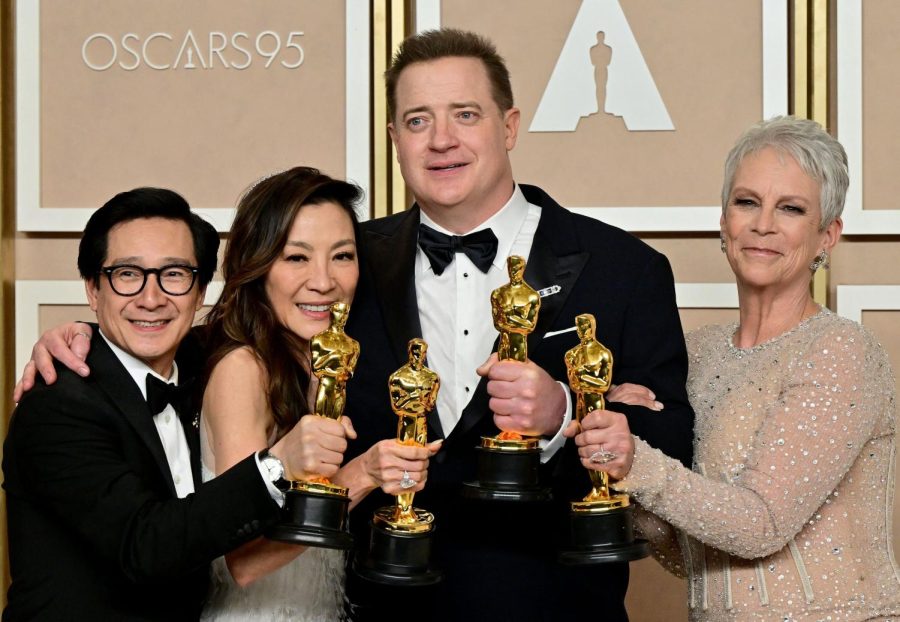Oscars boost Asian representation in awards season
At this year’s Oscars, “Everything Everywhere All at Once” was nominated for 11 awards and won seven.
March 25, 2023
The prominent success of Asian and Asian American performers this award season is drawing new attention to the lack of recognition given to people of Asian descent in former years.
The 95th Academy Awards were held March 12. “Everything Everywhere All at Once,” a sci-fi adventure film with a predominantly Asian cast, swept the night with 11 nominations and seven wins.
Irika Tso, freshman in DGS, said she was happy to see her Asian American community represented in the acclaim the film has received.
“I was very proud to see my own representation at the Oscars,” Tso said. “It can be rare to see minority representations win on American television.”
While the abundance of success is certainly something to celebrate, it also invites reflection on why Asian and Asian American representation has been noticeably absent in the past.
Get The Daily Illini in your inbox!
Only 23 actors and actresses of Asian descent have ever been nominated in the over 90 years the Oscars have been held. Four of those nominations occurred this year.
Leyna Tran, freshman in AHS, said she was “disappointed but not at all surprised.”
“It’s hard to trust the credibility of the Oscars and other Western award shows when it is so obvious that they are racially biased,” Tran said.
But how does this bias occur in such a prestigious and internationally recognized ceremony?
With 17 branches of over 10,000 members, the Academy of Motion Picture Arts and Sciences appears to have a comprehensive method of selecting Oscar winners.
Academy members are industry professionals who each rank nominees in order of preference to pick a winner.
However, data collected on the 2022 voters at the Academy Awards show that only 19% of those voters do not identify as white.
Chilin Shih, head of the Department of East Asian Languages and Cultures, said white board members reviewing Asian actors and directors creates a disconnect.
Shih referred to Michelle Yeoh, the 2023 Oscar winner for best actress, and her previous role in an action-adventure film released in 2000 entitled “Crouching Tiger, Hidden Dragon.”
Shih said Yeoh’s work in “Crouching Tiger, Hidden Dragon” was not as widely recognized by members of the American film industry. Shih said Yeoh’s performance in the movie was “fantastic, but very subtle.”
Shih said Yeoh’s portrayal of a mother in “Everything Everywhere All at Once” is “a good capture of a general feeling, a general emotion, that doesn’t have a cultural or national boundary.”
On the other hand, Shih said Yeoh’s role in “Crouching Tiger, Hidden Dragon” requires a deep understanding of Asian culture, and Asian expressions of emotion, to appreciate her performance.
“I feel that there is a gap between Hollywood and the very diverse and rich culture out there in the world,” Shih said.
Shih said closing such a gap in cultures is a complex process as “we have to make people understand and appreciate our societies, our histories, our languages … and particularly our different value systems.”
Shih also noted that viewing an accurate portrayal of Asian culture through film can help members of the Academy and any Americans form new understandings of Asian cultures.
“Watching movies should be a good way to expose people to the differences of a culture and their value systems,” Shih said.
But accurate and meaningful representation isn’t always found easily in the media. Younger people, like Tran, are painfully aware of this.
“I’ve known for a very long time that I had to search long and hard if I wanted to watch a movie or TV show where a character looked like me or wasn’t a total stereotype,” Tran said.
However, in Shih’s eyes, films like “Everything Everywhere All at Once” may be the true representation young members of the Asian American community are looking for.
“I think this film has done a lot by bringing the fundamentals of a different society, a different culture, into the American landscape,” Shih said. “And I truly appreciate that.”
As the Academy hopefully strives to form a deeper connection with other cultures, members of Asian and Asian American communities like Tran continue to celebrate this year’s talented winners and their exceptional performances.
“I’m a Vietnamese American child of immigrants myself, so seeing so many people connect with and celebrate a victory for actors that looked like me made me feel really lucky and empowered,” Tran said.







